Why is my menstrual cycle getting shorter?

Whether you meticulously track your period or not, you probably still have a general sense of how long your cycles last. So it can be a bit alarming if it feels like your period is longer or shorter than normal.
In this article, we’ll be covering everything you need to know about short periods specifically, including why they happen, how they change as you age, and when you should seek guidance from your doctor.
Quick menstrual cycle recap
What guides the menstrual cycle?
The menstrual cycle is guided by five key reproductive hormones. This includes luteinizing hormone (LH), follicle-stimulating hormone (FSH), estrogen and estradiol (E2), and progesterone (PG).
How long is the typical menstrual cycle?
Research shows that on average, menstrual cycles last around 28 days in total. However, anywhere between 21 to 35 days is still considered normal.
When does my period happen during the menstrual cycle?
The first day of your period is also the first day of your menstrual cycle, and the typical period can last anywhere from two to seven days.
Common reasons for shorter periods
Age
It is natural for your period to vary in duration and volume over the course of your life. For example, it’s common for periods to be more irregular during puberty as hormone levels adjust for adulthood. It’s also normal for periods to become lighter and more irregular ahead of menopause.
Stress
Stress wreaks havoc on our entire body – especially our hormone levels. When we are stressed, the body ramps up the production of the hormone cortisol. This increase in cortisol can cause your period to be lighter than normal and/or delayed. It can also cause you to skip a period.
Weight changes
Losing or gaining a significant amount of weight in a short period of time can also disrupt your hormone levels. This disruption can of course lead to lighter periods, missed periods, and irregular periods.
Excessive exercise
Individuals who exercise excessively are likely to burn more calories than they consume. When this occurs for a prolonged period of time, it can cause the body to halt certain non-critical functions (such as hormone production) in order to prioritize more critical functions (such as breathing). The result? Lighter and missed periods.
Medication
Certain medications are also known to impact your period. This includes hormonal birth control, which causes “breakthrough bleeding” that is typically much lighter than a normal period (although individual experiences can vary greatly).
Other medications that may affect your period include certain blood clot medications, aspirin and NSAIDs, thyroid medication, antidepressants, epilepsy medication, and chemotherapy.
Underlying medical conditions
Certain medical conditions can also disrupt your body’s ability to balance its hormones and/or have a regular cycle. Potential underlying conditions that may affect your cycle include polycystic ovarian syndrome (PCOS), ovarian cysts, thyroid disorders, premature ovarian failure, and cervical stenosis.
Recent pregnancy or miscarriage
If you have recently been pregnant or experienced a miscarriage, it can take several cycles for your hormones to readjust back to their normal levels. In the meantime, it’s common to have light and irregular periods.
Lighter periods with age
Shorter cycles in your 30s
During your early 30s, your cycle will most likely be similar to how it was in your 20s. By now, you may also be more aware of what’s “normal” for you – which is extremely helpful for spotting any new changes or trends.
Once you reach your mid to late 30s, you may notice that your period is a bit of a mixed bag. This is especially true if you have recently had children.
On average, the menstrual cycle does tend to become shorter with age due to decreasing estrogen and progesterone levels. This is supported by research that suggests median cycle length decreases by approximately one day in women over the age of 40 compared to those between the ages of 18 to 24.
If you start to notice that your cycle is shorter and less frequent than normal, this could be a sign of perimenopause.
Lighter periods in your 40s
By the time you reach your 40s, your menstrual cycle will most likely become increasingly irregular and shorter. In addition, it may also become increasingly lighter than it was in your 30s. Again, this is due to decreasing estrogen and progesterone levels as you approach menopause.
Other tell-tale symptoms of menopause include mood swings, hot flashes, night sweats, vaginal dryness, insomnia, and low libido.
If you have gone 12 months in a row without your period, this means that you are officially in menopause. It’s a good idea to have a checkup with your doctor at this time for a full medical examination ahead of this next phase of your

A little extra support from an expert can go a long way
Book an online consultation with one of our Hormone Health Coaches.
Schedule NowCauses for Menstrual Cycle Concerns
Your menstrual cycle is not perfect, and it’s completely normal for its patterns to vary over the course of your life depending on your age, lifestyle, medications, and health.
However, there are certain situations where you should seek professional medical guidance. Make an appointment with your doctor if you:
- Are you under the age of 45 and your period suddenly becomes irregular?
- Regularly have a cycle that is shorter than 21 days or longer than 35 days.
- Regularly have a period that lasts longer than 7 days.
- Are under the age of 35 and have been trying to get pregnant for more than one year.
- Are over the age of 35 and have been trying to get pregnant for more than six months.
- Are experiencing debilitating cramps, pain, and/or emotional turmoil around your period that interrupts your daily life and routine?
Final Thoughts
Everyone’s menstrual cycle is different. And the more you know about your own cycle, the better you will be able to determine what is “normal” for you.
One of the best ways to stay in tune with your body and cycle is by tracking your hormones and fertility symptoms. Check out our hormone tracking app for support with period and fertility tracking.

Mira’s Editorial Process
All content produced by Mira meets stringent editorial standards, ensuring excellence and accuracy in language and medical precision. Every piece undergoes thorough fact-checking and review by qualified professionals. Check out our full editorial process to learn more.










